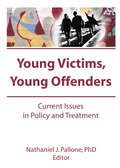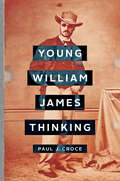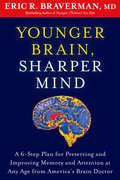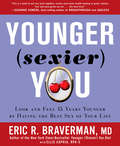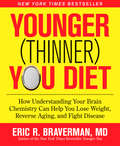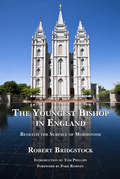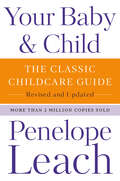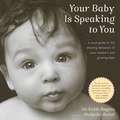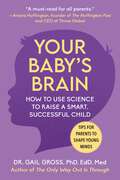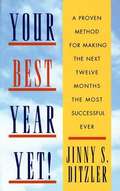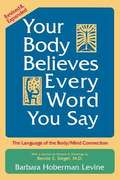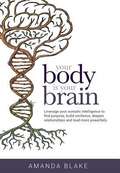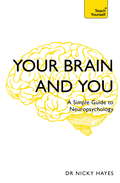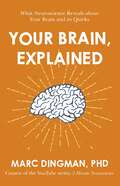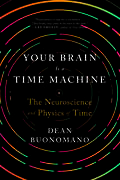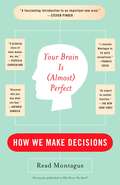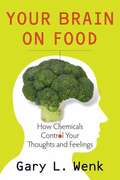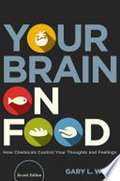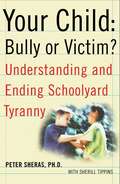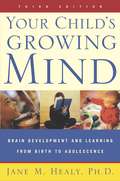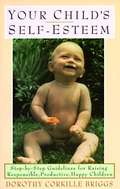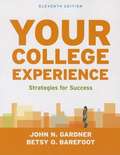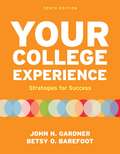- Table View
- List View
Young Victims, Young Offenders: Current Issues in Policy and Treatment
by Letitia C PalloneAt a time when the nation is focused on devising new responses to street crime and on reforming the juvenile justice system, this book brings together in a single volume, current and emerging perspectives on the control of crime by and against children and youth. Young Victims, Young Offenders provides you with an overview of established and emerging practices in treating juvenile offenders and adults who prey on children and youth.This book explores the nature and causes of criminal offenses committed by and against juveniles. While children and youth show up statistically as offenders, they also figure disproportionately as victims. The contributing authors consider both of these aspects as they discuss current programs for the treatment of youths who commit or are victimized by criminal offenses.Topics of a wide range are addressed in Young Victims, Young Offenders for people--like you-- who work with our nation’s youth. A sampling of topics includes: How states address child maltreatment through reporting laws and special courtroom procedures Associations between selected psychosocial variables and chronic delinquency Implications of mandatory Child Abuse Reporting Laws on treating offenders The success of diversion during a 20-year period in a youth service bureau Clinical techniques in the treatment of juvenile sex offenders A study on the effectiveness of an intervention program in Iowa for youthful offendersThis book is useful for the pre-service student pursuing course work in juvenile delinquency, correctional counseling, probation, parole, and social work. At the in-service level, correctional counselors, probation officers, parole officers, social workers, psychologists, psychiatrists, correctional administrators, and child care workers can find much to challenge and enhance their effectiveness in their work with young victims and offenders.
Young Widower: A Memoir (River Teeth Literary Nonfiction Prize)
by John W. EvansJohn W. Evans was twenty-nine years old and his wife, Katie, was thirty. They had met in the Peace Corps in Bangladesh, taught in Chicago, studied in Miami, and were working for a year in Romania when they set off with friends to hike into the Carpathian Mountains. In an instant their life together was shattered. Katie became separated from the group. When Evans finally found her, he could only watch helplessly as she was mauled to death by a brown bear.In such a love story, such a life story, how could a person ever move forward? That is the question Evans, traumatized and restless, confronts in this book as he learns the language of grief, the rhetoric of survival, and the contrary algorithms of holding fast and letting go. His memories of Katie and their time together, and the strangeness of his life with her family in the year after her death, create an unsentimental but deeply moving picture of loss, the brutality of nature, and the unfairness of needing to narrate a story that nothing can prepare a person to tell.Told with unyielding witness, elegance, and care, Young Widower is a heartbreaking account of a senseless tragedy and the persistence of grief in a young person’s life.
Young William James Thinking
by Paul J. CroceHow did youthful struggle give rise to the William James of philosophical legend and popularity?During a period of vocational indecision and deep depression, young William James embarked on a circuitous journey, trying out natural history field work, completing medical school, and studying ancient cultures before teaching physiological psychology on his way to becoming a philosopher. A century after his death, Young William James Thinking examines the private thoughts James detailed in his personal correspondence, archival notes, and his first publications to create a compelling portrait of his growth as both man and thinker.By going to the sources, Paul J. Croce’s cultural biography challenges the conventional contrast commentators have drawn between James’s youthful troubles and his mature achievements. Inverting James’s reputation for inconsistency, Croce shows how he integrated his interests and his struggles into sophisticated thought. His ambivalence became the motivating core of his philosophizing, the heart of his enduring legacy. Readers can follow James in science classes and in personal "speculations," studying medicine and exploring both mainstream and sectarian practices, in museums reflecting on the fate of humanity since ancient times, in love and with heart broken, and in periodic crises of confidence that sometimes even spurred thoughts of suicide. A case study in coming of age, this book follows the famous American philosopher's vocational work and avocational interests, his education and his frustrations—young James between childhood and fame. Anecdotes placed in the contexts of his choices shed new light on the core commitments within his enormous contributions to psychology, philosophy, and religious studies. James’s hard-won insights, starting with his mediation of science and religion, led to his appreciation of body and mind in relation. Ultimately, Young William James Thinking reveals how James provided a humane vision well suited to our pluralist age.
Younger Brain, Sharper Mind: A 6-Step Plan for Preserving and Improving Memory and Attention at Any Age from America's Brain Doctor
by Eric R. BravermanWhile gray hair and wrinkles may be unwelcome if inevitable signs of the passing years, the memory loss, intellectual impairment, and mood swings that come with an aging brain can be truly devastating.According to bestselling author and anti-aging expert Dr. Eric Braverman, getting older does not have to mean becoming forgetful, clueless, or depressed—quite the opposite, in fact. Distilling his 35 years of research and clinical experience into an easy-to-follow protocol, Dr. Braverman explains how men and women can actually build new brain cells, becoming younger and smarter as they age. Readers will learn what to eat to stay focused, when to exercise to sharpen their memory, and how to organize their lifestyle to improve problem-solving skills—and discover the revolutionary hormone therapies and medications available to treat cognitive decline.Having helped thousands take control of their hormones to maintain the physical and sexual vitality of their twenties and thirties, Dr. Braverman now presents Younger Brain, Sharper Mind, a simple plan to help them protect and enhance youth's most prized possession: a vigorous, capable mind.
Younger (Sexier) You: Enjoy the Best Sex of Your Life AND Look and Feel Years Younger
by Eric R. Braverman Ellie CapriaJust as he used the latest brain science to help tens of thousands reverse the effects of aging and achieve lasting weight loss, Dr. Eric Braverman now uses the most up-to-date research on hormones and the brain to explain how great sex contributes to great health, and vice versa. He explains that sexuality plays a huge role in keeping us young, fit, and healthy—helping with everything from cognitive function to stress reduction to appetite control. It has even been shown to increase levels of hormones that protect against infections and cancer. Furthermore, preserving a good sex life is an important factor in maintaining a loving relationship and curbing the urge to stray that can lead to unfaithfulness and disappointment. Beginning with a discussion of the brain and an explanation of sex codes, or how individuals personally view and approach sex, and a quiz to help each reader determine her specific sex code, Braverman looks closely at the major hormones involved with sexual activity and explains how to make permanent changes to four main areas affected by the aging process: libido, creativity, stamina, and satisfaction—for an additional 7-10 years of great sex. With information and advice to address the health concerns of men and women alike, Younger (Sexier) You will help every couple achieve greater pleasure and intimacy; showing them that that the most effective way to remain young and sexy just might be the most pleasurable.
Younger (Thinner) You Diet: How Understanding Your Brain Chemistry Can Help You Lose Weight, Reverse Aging, and Fight Disease
by Eric R. BravermanNew research in nutrition and weight loss has revealed an amazing discovery: the brain—virtually neglected in all other diet plans—is the most important organ in dieting. Dieters can actually lose weight by eating foods, nutrients, teas, and spices that change the chemical balance of the brain for permanent weight loss—a major factor contributing to how quickly the body ages. In fact, everyone can take years off their age by changing their brain chemistry. In Younger (Thinner) You Diet, Dr. Eric Braverman expands upon concepts introduced in Younger You to present a totally new approach to lifelong weight management, where the key is not found in counting carbs, fat grams, or calories. Obesity is a brain chemical imbalance, an addictive disorder, treated successfully only through the combined approach of diet, nutrients, and hormones. One of the foremost experts in integrative medicine, known for his work on the brain-body connection, Dr. Braverman teaches readers:- which foods naturally boost the body's production of dopamine, the chemical in the brain that tells the body to start its fat-burning engine- how to choose foods, supplements, teas, and spices—even hormones and medicine—to avoid the effects of other aging organs that can destroy one's metabolism- how to personalize the diet for specific health concerns, such as heart problems, aging skin, weak muscles, and achy jointsEliminating the frustration and deprivation of conventional dieting, Younger (Thinner) You Diet will help anyone turn back the clock to a slimmer, healthier, younger you.
The Youngest Bishop in England: Beneath the Surface of Mormonism
by Robert BridgstockPart memoir, part analytical work, this treatise details Robert Bridgstock's life as an active Mormon, his struggles with his faith, his submerging of such doubts for the sake of keeping peace with his devout family, and his eventual departure from the Church due to the abuse he suffered. After joining the Mormon Church at the age of 18, Bridgstock went on to become the youngest Mormon bishop in England and remained active in the Church for more than four decades, serving it in many capacities and deeply studying Mormon scripture and history. But after having and voicing doubts about Mormonism, and because Church authorities and scripture never delivered satisfactory answers to his questions, he left the Church and renounced the religion. An enthralling read from a leading figure within the Church, this account provides a unique, day-to-day look into Mormon life.
Your Baby & Child: The Classic Childcare Guide, Revised and Updated
by Penelope LeachThe classic—beloved, trusted, best-selling—guide to baby and child care completely redesigned and revised for a new generation of parents • From Penelope Leach, "a luminary in the world of child development" (The Boston Globe)Penelope Leach has helped millions of parents raise their children for more than forty years with her thoroughly researched, practical, baby-led advice, her wise, empathic, and sensible perspective, and her comforting voice. This new edition has been completely redesigned for today&’s parents. Leach has revised the text to reflect the latest research on child development and learning as well as societal changes and the realities of our current world. Your Baby & Child is essential—a bible—for every new parent. In easy to follow stages from birth through age five (newborn, settled baby, older baby, toddler, young child), Your Baby & Child addresses parents&’ every concern over the physical, emotional, and psychological well-being of their baby. Areas covered: feeding; physical growth and everyday care; sleeping; excreting and toilet mastery; crying and comforting; muscle power; seeing and understanding; hearing and learning to speak; playing and learning and thinking; learning how to behave.
Your Baby Is Speaking to You
by Abelardo Morell Kevin NugentFrom an international expert on infant-parent communication, Your Baby Is Speaking To You is destined to become a parenting classic. Through intimate access to babies and their families, Dr. Kevin Nugent and acclaimed photographer Abelardo Morell capture the amazingly precocious communications strategies babies demonstrate from the moment they are born. Your Baby Is Speaking to You illustrates the full range of behaviors--early smiling to startling, feeding to sleeping, listening to your voice and recognizing your face. The newest research--including information on subtle and fleeting behaviors not seen or explained in any other book--illuminates the meaning of the things babies do that concern and delight new parents: - the language of yawning - the rich range of cries, and how to understand their meanings - baby's earliest "sleep smiles" and sleep states, and what they signify Your Baby Is Speaking To You delivers the information parents crave in gentle, accessible style while giving parents the confidence they need to respond to their own baby's way of communicating during the very first astonishing days and the months beyond.
Your Baby's Brain: How to Use Science to Raise a Smart, Successful Child—Tips for Parents to Shape Young Minds
by Gail GrossWinner of the 2019 National Parenting Product Award • Ranked #1 by BookAuthority for 2019 Best New Parenting Books"This will give your child the greatest opportunity to reach her fullest potential, both emotionally and intellectually.&” —Goldie Hawn, Academy Award and Golden Globe–winning actress, and founder of the Hawn foundation"A must-read for all parents.&”—Arianna Huffington, founder & CEO of Thrive Global and founder of The Huffington PostYour child&’s DNA is not destiny; you are at the helm, guiding their course. With this book, you can learn how to:Harness your power as a parent Use science to guide and nurture your child so they can achieve all of their dreamsShape your child's brain in early years and set a healthy foundation that will enrich the rest of their livesAvoid parenting pitfalls that will set your child's intellectual and social development back by years The truth is, nature and nurture are in a delicate dance—if one goes too fast, the other one falls. Science tells us that early childhood experiences have the capacity to structure and alter the brain. That means you didn&’t just supply your child&’s DNA—you&’re still shaping it. And it&’s only by wielding this power that your child will activate their full potential. You are truly a gene therapist; manipulating and guiding your child&’s genetic makeup based on the experiences you create for them. Contrary to what modern parenting trends have told us, parenting is much simpler than we dared to imagine. Great parenting comes down to one mission: to be prepped and present for the windows of your child&’s development so that you can take full advantage of these formative periods and help your child become a smart, successful, self-sufficient adult. It doesn&’t require formal training or a fancy degree—all it takes is getting involved. Once parents learn how to flip the right gene &“switches,&” they can expand the limits of their child&’s potential and lay the emotional and intellectual groundwork that allows them to seize opportunities for success fearlessly, naturally, and enthusiastically. With a PhD. in education and a second in psychology, and forty years of experience as an educator, Dr. Gross combines an understanding of childhood development with practical and realistic tools to teach parents how to best take advantage of their child&’s developmental windows. Your Baby's Brain translates the results from scientific studies about expanding consciousness and performance into day-to-day interaction between parents and children.
Your Best Year Yet: A Proven Method for Making the Next Twelve Months the Most Successful Ever
by Jinny S. DitzlerThis book is a transformational goal-setting program that will guide you toward Your Best Year Yet.
Your Body Believes Every Word You Say: The Language of the Body/mind Connection
by Barbara Hoberman Levine Bernie S. SiegelThe author's 15-year struggle with a then-inoperable brain tumor led to her discovery of the "seedthoughts" and "core beliefs" that link one's mind and body. In this book, Levine shows, via simple, non-medical language and 53 self-help exercises, how one can use an illness as a vehicle for increased self-understanding and healing.
Your Body is Your Brain: Leverage Your Somatic Intelligence to Find Purpose, Build Resilience, Deepen Relationships and Lead More Powerfully
by Amanda Blake<p>Around the world, a swelling tide of people are discovering an astonishing, life-altering truth. This book tells their extraordinary stories: <p> <li>an anxious PhD student builds his confidence by changing his workout <li>back exercises help one woman negotiate a fix to a botched home repair <li>a Microsoft executive grows credibility by shifting her stance <li>an executive team leads their company to a 30% increase in valuation by dancing together</li> <p> <p>In this timely and engaging book, Amanda Blake synthesizes research from over two dozen scientific fields to reveal how you, too, can come to embody vital qualities such as these: <p> <li>align your daily activities with a deeper sense of meaning and purpose <li>become more relaxed, confident, and at ease in high-pressure situations <li>shatter limitations that have been immune to "the power of positive thinking" <li>create better relationships at work and at home <li>turn conflict into opportunity</li> <p> <p>...and many more valuable skills that will enable you to contribute, succeed and enjoy life at the highest levels. Strengthen your social and emotional intelligence by cultivating your innate somatic intelligence. This is powerful applied mind-body science, in the workplace and beyond. <p>Tap the intelligence hidden in posture, gesture, and sensation and you will open the door to more meaning, greater courage, deeper connection, and more powerful leadership than you imagined possible.</p>
Your Brain and You: A Simple Guide to Neuropsychology
by Nicky HayesMost general knowledge about the brain and its workings is very dated, drawing on studies from the first part of the previous century or even earlier. However, the advent of brain scanning which allows the study of the ordinary working brain, rather than just dead ones or people having brain surgery, has resulted in some amazing new developments that contribute immensely to our general social understanding of people and how they work. Written by Dr Nicky Hayes, bestselling author of Understand Psychology, Your Brain and You is a beginner's guide to neuropsychology. It takes you through every aspect of how your brain works, from nervous systems and brain structures to neural transmission and neural correlates. You will discover how it all began, how it works, how we see, do things, hear and experience the outside world. Explore memories, relationships, emotions, decision-making, sleep, consciousness and common disorders such as dyslexia, dysgraphia & dyscalculia. As with all Teach Yourself books, it is clearly structured, packed full of practical examples, and designed to make it easy to learn the essentials you really need to know.ABOUT THE SERIESPeople have been learning with Teach Yourself since 1938. With a vast range of practical how-to guides covering language learning, lifestyle, hobbies, business, psychology, and self-help, there's a Teach Yourselfbook for everything you want to do. Join more than 60 million people who have reached their goals with Teach Yourself, and never stop learning.
Your Brain and You: A Simple Guide to Neuropsychology
by Nicky HayesMost general knowledge about the brain and its workings is very dated, drawing on studies from the first part of the previous century or even earlier. However, the advent of brain scanning which allows the study of the ordinary working brain, rather than just dead ones or people having brain surgery, has resulted in some amazing new developments that contribute immensely to our general social understanding of people and how they work. Written by Dr Nicky Hayes, bestselling author of Understand Psychology, Your Brain and You is a beginner's guide to neuropsychology. It takes you through every aspect of how your brain works, from nervous systems and brain structures to neural transmission and neural correlates. You will discover how it all began, how it works, how we see, do things, hear and experience the outside world. Explore memories, relationships, emotions, decision-making, sleep, consciousness and common disorders such as dyslexia, dysgraphia & dyscalculia. As with all Teach Yourself books, it is clearly structured, packed full of practical examples, and designed to make it easy to learn the essentials you really need to know.ABOUT THE SERIESPeople have been learning with Teach Yourself since 1938. With a vast range of practical how-to guides covering language learning, lifestyle, hobbies, business, psychology, and self-help, there's a Teach Yourselfbook for everything you want to do. Join more than 60 million people who have reached their goals with Teach Yourself, and never stop learning.
Your Brain, Explained: What Neuroscience Reveals about Your Brain and its Quirks
by Marc DingmanSleep. Memory. Pleasure. Fear. Language. We experience these things almost every day, but how do our brains create them? Your Brain, Explained is a personal tour around your gray matter. Neuroscientist Marc Dingman gives you a crash course in what goes on in your brain and explains the latest research on the brain functions (and malfunctions) that affect you on a daily basis. You'll also discover what happens when these systems don't work the way they should, causing problems such as insomnia, ADHD, depression or addiction, how neuroscience is working to fix these problems, and how you can build up your defences against the most common faults of the mind.Along the way you'll find out:·Why brain training games don't prevent dementia (and what does)· What it's like to remember every day of your life as if it were yesterday· Which mental ailment used to be treated with German rocket fuel· What triggers sleep loss, or lapses in concentrationDrawing on the author's popular YouTube series, 2-minute Neuroscience, this is a friendly, engaging introduction to the human brain and its quirks from the perspective of a neuroscientist - using eye-opening illustrations and real-life examples. Your brain is yours to discover.
Your Brain Is a Time Machine: The Neuroscience and Physics of Time
by Dean Buonomano"Beautifully written, eloquently reasoned…Mr. Buonomano takes us off and running on an edifying scientific journey." —Carol Tavris, Wall Street Journal In Your Brain Is a Time Machine, leading neuroscientist Dean Buonomano embarks on an "immensely engaging" exploration of how time works inside the brain (Barbara Kiser, Nature). The human brain, he argues, is a complex system that not only tells time, but creates it; it constructs our sense of chronological movement and enables "mental time travel"—simulations of future and past events. These functions are essential not only to our daily lives but to the evolution of the human race: without the ability to anticipate the future, mankind would never have crafted tools or invented agriculture. This virtuosic work of popular science will lead you to a revelation as strange as it is true: your brain is, at its core, a time machine.
Your Brain Is (Almost) Perfect
by Read Montague?A fascinating introduction? (Steven Pinker) to the science of decision-making One of the leading thinkers in the computational neuroscience revolution offers a brilliant new perspective on the mind?s decision-making process. Why do we make the choices we make? How can science explain free will? If our brains are like slow computers originally programmed for survival with goals like food, water, and sex, why do we make choices that go against our own biological best interests? Where do values come from? What role do emotions play? From how we decide what we consume to the romantic, ethical, and financial choices we make, Read Montague guides readers through a new approach to the mind that is both entertaining and illuminating.
Your Brain on Food: How Chemicals Control Your Thoughts and Feelings
by Gary L. WenkWhy is eating chocolate so pleasurable? Can the function of just one small group of chemicals really determine whether you are happy or sad? Does marijuana help to improve your memory in old age? Is it really best to drink coffee if you want to wake up and be alert? Why is a drug like PCP potentially lethal? Why does drinking alcohol make you drowsy? Do cigarettes help to relieve anxiety? What should you consume if you are having trouble staying in your chair and focusing enough to get your work done? Why do treatments for the common cold make us drowsy? Can eating less food preserve your brain? What are the possible side effects of pills that claim to make you smarter? Why is it so hard to stop smoking? Why did witches once believe that they could fly? In this book, Gary Wenk demonstrates how, as a result of their effects on certain neurotransmitters concerned with behavior, everything we put into our bodies has very direct consequences for how we think, feel, and act. The chapters introduce each of the main neurotransmitters involved with behavior, discuss its role in the brain, present some background on how it is generally turned on and off, and explain ways to influence it through what we consume.
Your Brain On Food: How Chemicals Control Your Thoughts And Feelings
by Gary L. WenkIn Your Brain on Food, Dr. Gary Wenk expands his discussion of the effects of specific foods on the brain in a completely updated second edition. From investigations into the benefits and risks of supplements, to the action of gluten in the brain and marijuana's potential for pain relief, Dr. Wenk draws on the latest science to answer a range of fascinating questions such as: <p><p> -Is your aluminum cookware hurting you? <p> -Can tryptophan supplements improve your mood? <p> -How do fruits and vegetables protect us from aging? <p> -Why does eating chocolate make you feel so angry? <p> -Does our brain want us to be obese? <p> Never forget--everything we consume can affect how we think, feel, and act. <p> NEW TO THIS EDITION <p> -Updated second edition greatly expands discussions on the effects of specific foods on the brain <p> -Clarifies the role of biorhythms in how food affects the brain and behavior <p> -Investigates why our brain makes us crave fat, salt, and sugar
Your Child: Bully or Victim? Understanding and Ending School Yard Tyranny
by Peter Sheras Sherill TippinsWhat can you say to a son who comes home day after day complaining of being threatened or hit or worse? What if your daughter is clearly the victim of vicious teasing but doesn't even want to talk about it? What should you do when you suspect your child may, in fact, be the bully? Your Child: Bully or Victim? offers hands-on help for parents to stop bullying before it becomes serious, including how to: Recognize the many forms abuse can take -- from playground name-calling to chat room cyber-slamming. Detect whether your child is a victim of bullying and empower him to protect himself. Combat such common (and dangerous) myths as "Boys will be boys..." and "Just ignore them and they'll go away." Help your child know what to do when he witnesses an incident. Know when it's time to step in and talk to other parents or teachers in order to protect your child -- what to say and how to say it.
Your Child's Growing Mind: Brain Development and Learning from Birth to Adolescence
by Jane HealyThe completely updated and expanded version of the 1987 classic hailed by parents and educators everywhere.
Your Child's Self-Esteem
by Dorothy Corkille BriggsThis book provides step-by step guidelines for raising responsible, productive, happy children.
Your College Experience: Strategies for Success 11th edition
by John N. Gardner Betsy O. BarefootWhile maintaining its hallmark theme of goal setting, the Eleventh Edition reflects a focus on practical strategies across all topics of the book to help students be successful from the start. Chapters on Time Management, Communication and Information Literacy, and Careers and Majors have all been thoroughly updated to fully incorporate the tools and strategies students use on campus right now.
Your College Experience: Strategies for Success (Tenth Edition)
by John N. Gardner A. Jerome Jewler Betsy O. BarefootWritten by the leading authorities on the first-year seminar and grounded in research, Your College Experience by John Gardner and Betsy Barefoot offers today's diverse students the practical help they need to make the transition to college and get the most out of their time there. Goal setting has always been central to this text, and the Tenth Edition has been revised with added coverage and activities to strengthen this material throughout. In addition, a new focus on self-assessment of strengths will help students see where they are already succeeding so that they get off to a great start and stay in college. A full package of instructional support materials -- including an Instructor's Annotated Edition, Instructor's Manual, PowerPoint slides, videos, and a Test Bank -- provides new and experienced instructors all the tools they will need to engage students in this course and increase student retention.
